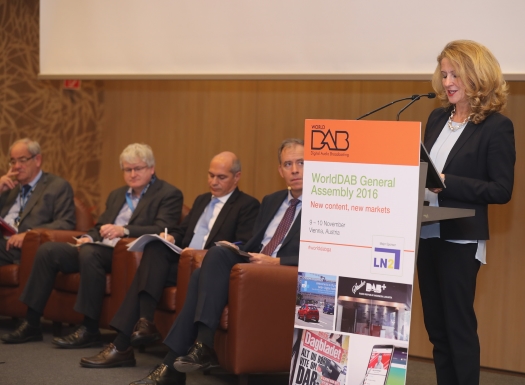Asian broadcasters are watching intently as European government ministers, broadcasters, regulators and technology vendors gathered at the WorldDAB General Assembly in Vienna on Thursday to set out their vision for the future of digital radio.
With a theme of “New content – New markets”, the General Assembly focused on the new audiences and revenue opportunities being delivered by digital radio.
Speakers included Absolute Radio in the UK, that has doubled its audiences via digital radio, newly created Dutch radio group Newco, and Wireless Group (recently acquired by News Corp), both of which have DAB+ firmly at the core of their digital strategy. Also presenting was local radio station Angel Radio, which was able to join the migration to digital in the UK thanks to small-scale DAB.
In the months leading up to the start of the world’s first digital switchover in Norway, DAB has established itself as the core future platform for radio across Europe and Australia, with 56 percent of European citizens now able to receive DAB services.
“DAB continues to go from strength to strength and today we’ve heard very clearly about government commitment at the individual country level,” said Patrick Hannon, President WorldDAB. “A growing body of voices is now calling for more active support from the European Commission, promoting the case that radio receivers should be required to have both FM and digital capability. Such a move would benefit both new and developed digital radio markets.”
In the keynote session, speakers addressed the international audience of over 200 radio industry professionals on the future of digital radio and the need for collaboration.
Heike Raab, Plenipotentiary for Federal and European Affairs, for Media and Digital Affairs of the Land of Rhineland-Palatinate said: ” Since there are many advantages to be gained through DAB, the Digital switchover is only a question of time. The simulcast phase should be as short as possible and as long as necessary.”
Line Langnes, Senior Legal Adviser and Project Manager, Norwegian Media Authority said: “The digitization of radio enables broadcasters to offer more content, and recent surveys shows that digital radio listening in Norway are increasing in terms of both reach and share. Our focus is to ensure that the public are well informed about the switchover and what they need to do, particularly for drivers who are still to adapt their cars.”
Patrice Gélinet, Board Member of the Council, Conseil supérieur de l’audiovisuel (CSA) said: “Additional calls for applications will take place in the months and years ahead, meaning that by 2023, the entire French population will be able to receive DAB. DAB success factors among our neighbours demonstrate the appetite of the industry and of the listeners for digital radio broadcasting. Beyond the known benefits of technology, the diversity, plurality and commitment of stakeholders of the radio ecosystem demonstrate that DAB is an integral part of the future of radio in Europe and therefore in France.”
Viliam Podhorský, Director, Electronic Communications Department, Ministry of Transport, Construction and Regional Development (MDVRR SR), Slovakia said: “The transition from analogue to digital broadcasting represents a significant technological change and working closely with other countries will be crucial to its success. An important part of the process of deployment in Slovakia will be drawing up an effective legal framework to include incentives for broadcasters, ensuring coverage is comparable to analogue, delivering content with added value and the commitment of all parties to participate in this process.”
Andreas Geiss, Head of Unit – Radio Spectrum Policy, DG CONNECT, European Commission said: “We are interested in the modernisation of radio transmission networks and we are happy to see that the market for DAB+, as well as for Internet radio, is developing. We have already endorsed DAB through inclusion in our list of standards that Member States should encourage for use. Intervention at EU level must respect the principle of subsidiarity and show added value. In whatever we do we should ensure that the consumer is able to choose in terms of service and price. We encourage broadcasting, car and telecom industries to collaborate.”
Other sessions featured updates from developed markets on the path towards digital switchover, emerging markets on DAB progress to date and industry analysts on automotive adoption and receiver sales around the world.
Recently released statistics show that DAB adoption in the car continues to rise, with almost all car manufacturers now offering DAB radio either as standard or as an option. As the first countries start to switch off their FM signals, it will be increasingly important for car makers to ensure that all vehicles are fitted with DAB as standard.

